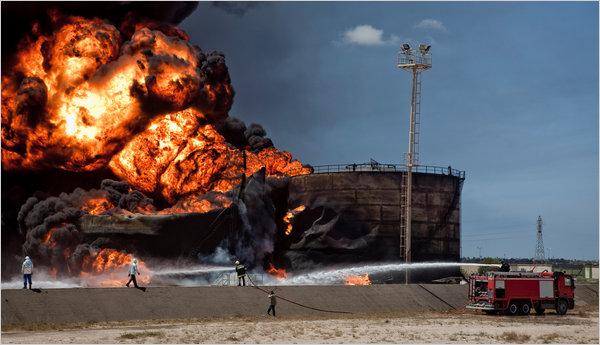
SAUDI'S DEFICIT 20%

The full extent of the impact of slumping crude prices on Saudi Arabia's public finances has been highlighted by the International Monetary Fund in a new report telling oil exporters to be braced for a prolonged period of disruption to their budgets.
The fund's half-yearly fiscal monitor report shows that in the past three years a hefty budget surplus in Saudi Arabia has been turned into a deficit of more than 20% of GDP – double the shortfalls seen in the UK and the US during the worst of the global slump of 2008-09.
Other leading oil exporters – Russia, Libya, Venezuela, Kuwait, Qatar, the United Arab Emirates, Oman and Angola – have also suffered marked deteriorations in their public finances as a result of the fall in crude from a peak of almost $130 a barrel in 2012 to just under $53 currently.
"Natural resource-rich countries benefited from an exceptional commodity price boom during the 2000s, with metal and oil prices reaching historic highs," the report said. "This provided a substantial boon to resource-rich developing countries, which benefited from large increases in fiscal revenues and the opportunity to promote economic transformation and development."
The IMF report shows how the rapid increase in oil prices from 2003 onwards strengthened the public finances of Saudi Arabia. The world's biggest crude exporter was running a budget surplus of 12% of gross domestic product in 2012, but this had turned into a deficit of 3.4% of GDP two years later.
Saudi's budget deficit is expected to peak at 21.6% of GDP this year and fall only slowly to 14% of GDP over the next five years.
Other countries show a similar profile. Kuwait's budget surplus peaked at 34.7% of GDP in 2012 but it is on course to just about balance the books with a surplus of 0.1% of GDP in 2016.
Angola's surplus of 8.7% of GDP in 2011 had become a 6.4% deficit three years later. But the sharpest deterioration was in Libya, where the fall in prices has been compounded by production losses caused by conflict. The country, which was running a budget surplus of 11.6% of GDP in 2011, will be running a budget deficit of 79.1% of GDP this year, according to the IMF.
The fund said the recent slide in commodity prices "has driven home the fact that commodity prices are volatile, unpredictable and subject to long-lasting shocks.
"It has also meant that commodity exporters will need to adjust to a – possibly protracted – period of lower export and fiscal revenues."
Saudi Arabia's finance minister, Ibrahim Alassaf, announced last month the country would impose spending cuts in response to a drop in the oil price that has caused its budget deficit to balloon to $120bn.
The Middle Eastern kingdom needs an oil price of $100 a barrel to balance the budget but has so far relied on running down its massive reserves to bridge the gap between rising spending and falling tax revenues.
Although the IMF believes Saudi Arabia's reserves provide "significant protection" for the next five years, the country's rulers have decided that they cannot continue to use up financial assets at the current rate.
The fund said countries with endowments of natural resources needed to build up war chests when commodity prices were rising in order to be able to withstand periods when prices were falling.
Warning that exhaustible mineral and hydrocarbon wealth can be a "resource curse", the fund added: "Countries face important trade-offs between how much to consume of their nonrenewable resource wealth and how much to save in the form of financial savings and other assets (for example, public infrastructure)."
theguardian.com
-----
More:






